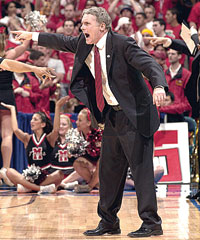NCAA News Archive - 2007
« back to 2007 | Back to NCAA News Archive Index
Monitoring emphasis on coach and player bench behavior among first tasks
|
The NCAA News
 When John W. Adams refereed his last men's college basketball game in February 1989, he thought officiating was in his rearview mirror.
When John W. Adams refereed his last men's college basketball game in February 1989, he thought officiating was in his rearview mirror.
It may have been for on-court duty (an old knee injury forced him to give that up), but he continued to contribute to the game by becoming an evaluator of officials.
Now after 15 years of recommending officials for postseason assignments at the high school and intercollegiate levels, Adams has been named the NCAA national coordinator of men?s basketball officiating.
Adams succeeds Hank Nichols, who announced his retirement from the position at the end of the 2007-08 season.
Through the years, Adams approached this part of his athletics career with the same business acumen he used in his commercial real estate profession, from which he retired in 2004.
He is entering his ninth and final year as the coordinator of officials for the Horizon League. He also serves as the coordinator of officials for the Division II Great Lakes Valley Conference and the Division III Heartland Collegiate Athletic Conference.
Bench decorum
Adams will shadow Nichols throughout the rest of the season. Among areas both men will attend to is how officials enforce rules involving bench decorum.
The initiative endorsed by the NCAA, the Collegiate Commissioners Association, the National Association of Basketball Coaches and the Women's Basketball Coaches Association calls for head coaches and other bench personnel who engage in unsportsmanlike actions in or out of the coaching box to be assessed a technical foul without being issued a warning.
Unsportsmanlike actions include:
- Disrespectfully addressing an official.
- Attempting to influence an official's decision.
- Using profanity or language that is abusive, vulgar or obscene.
- Taunting or baiting an opponent.
- Objecting to an official's decision by rising from the bench or excessively using gestures that either demonstrate officiating signals or displeasure with officiating.
- Inciting undesirable crowd reactions.
- Entering the playing court (unless done with permission of an official to attend to an injured player).
The Division I Women?s Basketball Committee took the lead on this issue in the 2006-07 season, and stakeholders on the men's side have followed suit.
"This is not intended to create a witch hunt," said Adams, who is the managing partner of a group that owns Plum Creek Golf Club in Carmel, Indiana.
Instead, it is a point of emphasis for officials this season. Much like palming violations, rough play in the paint and illegal screens, officials will be keeping an eye on bench behavior.
"These rules have been on the books," Adams said. "This is a sportsmanship issue, pure and simple. We are asking our officials at all levels to pay more attention to how a coach behaves, and where he is behaving."
The concept has raised questions in the coaching community as to what constitutes poor behavior and whether the emphasis will diminish as the season progresses.
Some coaches worry the effort is too far-reaching. University of North Carolina, Chapel Hill, men's coach Roy Williams told reporters during the Atlantic Coast Conference media day that he is afraid "that we're going to go overboard on the thing."
"The intent of the NABC was to try to get coaches to show good sportsmanship and to get coaches to remain in the coaches' box and not gain an advantage by one coach being able to communicate better to his team than the other guy who did stay in his box," Williams said.
Adams said coordinators will expect officials to be firm when a clear violation takes place -- but also use good judgment.
"We're not talking about just a foot or toenail on the court," Adams said. "What we don't want are coaches clearly and completely on the court."
The message already has been delivered via directives from conference coordinators of officials, DVDs and conference commissioners. While coaches may have to make some adjustments early on, Adams said everyone will know what is acceptable and what is not.
"I don't think we've had this kind of broad-based approach to getting this information to the coaches as many different ways as we have,? Adams said. ?Coaches have had four or five chances to learn about this."
Adams believes the men calling the games will be able to manage the situation properly.
"Referees have the final say because they have the whistle around their necks," Adams said. "They have to use it judiciously. What I tell my guys is, you want to create a fair environment where the team that plays best has a chance to win. That's the job of officials."
With that said, let the evaluations begin.
John W. Adams
1971 — Refereed intramural games at Indiana State University while earning a degree in political science.
1974 —While holding a job in commercial real estate in Indianapolis, Adams began officiating junior high school basketball games and eventually began calling junior varsity and varsity high school games.
1992 —Began evaluating officials for the Indiana High School Athletic Association.
1993 —Began managing the Horizon League basketball tournament in Indianapolis.
1999 —Named the Horizon League coordinator of men?s basketball officials.
2002 —Named coordinator of officials for the Heartland Collegiate Athletic Conference.
2004 —Named coordinator of officials for the Great Lakes Valley Conference.
2007 —Appointed to succeed Hank Nichols as NCAA national coordinator of men?s basketball officiating.
© 2010 The National Collegiate Athletic Association
Terms and Conditions | Privacy Policy

